

Research Library. G8 urged to tackle malnutrition, the hidden killer in Mozambique. For their meal tonight, Olinda Novela and her children will dine on tree root soup.
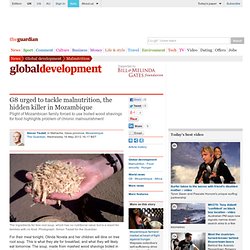
This is what they ate for breakfast, and what they will likely eat tomorrow. The soup, made from mashed wood shavings boiled in salty water, has zero nutritional value. It is a thin, brown, evil-looking gruel. But in remote, drought-stricken Mahache village, about five hours' drive north from Mozambique's capital, Maputo, there is simply no other choice. Novela, 37, has four children still at home; another four have moved away. They have much in common with many other Mozambican children, with an estimated 44% of under-fives physically or mentally impaired – the technical term is stunted – because of severe malnutrition. "I am hungry. She says there has been no fresh food in Mahache since January. The problem extends far beyond Mahache and its scale is daunting. Globally, malnutrition is the key cause of the deaths of 2.6 million children each year. 7% Annual GDP growth in Mozambique. G8 leaders urged to focus talks on growth. Third Annual Malthus Lecture, May 22, 2012.
Private sector organisations commit to support the G8 food security agenda. SABMiller plc announces the launch of the first ever commercial-scale cassava-based beer , 'Impala'.
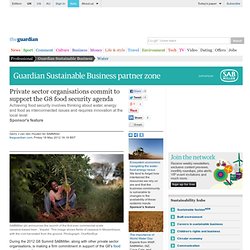
This image shows fields of cassava in Mozambique, with the root harvested from the ground. Spotlight on Food Security: The Key to Economic, Environmental and Global Stability. Tjada McKenna, Deputy Coordinator for Development for Feed the Future | USAID | USAID IMPACTblog You may have noticed a lot of increased talk about “food security” lately, particularly in the international development realm.
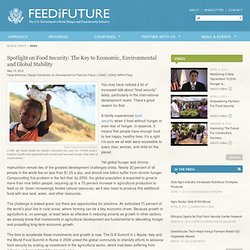
There’s good reason for that. A family experiences food security when it lives without hunger or even fear of hunger. In essence, it means that people have enough food to live happy, healthy lives. It’s a right I’m sure we all wish were accessible to every man, woman, and child on the planet. Yet global hunger and chronic malnutrition remain two of the greatest development challenges today. The challenge is indeed great, but there are opportunities for solutions. The time to accelerate these investments and growth is now. Three years after L’Aquila, the leaders of the G8 are preparing to meet once again, this time at the 2012 G8 Summit at Camp David on May 19.
This post originally appeared on the USAID IMPACTblog. 14 May 2012: Reviewing evidence on monitoring systems for agriculture, poverty and environment. Global development: Food security. World news: Food safety. Sustainable Agriculture and Food. Strategy and Evidence Plans « Evidence: science, statistics, economics, research. Research and analysis provides evidence for decision-making, ensuring Defra’s polices are based on a sound, comprehensive understanding of current evidence.
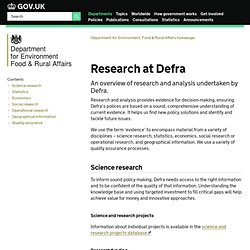
It helps us find new policy solutions and identify and tackle future issues. We use the term ‘evidence’ to encompass material from a variety of disciplines – science research, statistics, economics, social research or operational research, and geographical information. We use a variety of quality assurance processes. Science research To inform sound policy-making, Defra needs access to the right information and to be confident of the quality of that information. Home - Global Food Security. Reports and publications.
This project explored the increasing pressures on the global food system between now and 2050.
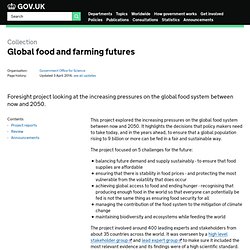
It highlights the decisions that policy makers need to take today, and in the years ahead, to ensure that a global population rising to 9 billion or more can be fed in a fair and sustainable way. Why the Foundation Funds Research in Crop Biotechnology. We invest in the following strategic areas that we believe will help address the challenges and local realities faced by farming families in the developing world.
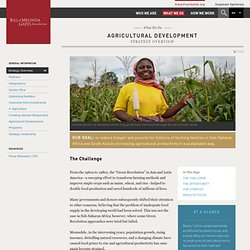
Research and Development Researchers are seeking ways to combat crop disease such as those infecting the cassava plants on this Tanzania farm. We support research to develop more productive and nutritious varieties of the staple crops grown and consumed by farming families. Crops & Agronomy Research. Home > Research > Crops & Agronomy Research Highlights A major contributor to R&D in UK agricultureWorks within the whole industry to develop key research areasReports a wide range of ongoing independent field studiesTakes a leading role in knowledge transferProvides bespoke research services for groups and businesses Crops and Agronomy Research aims to champion the role of independent agronomic research in UK agriculture.
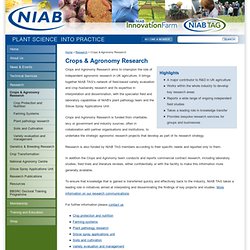
ERDF - EU Regional Policy. The ERDF aims to strengthen economic and social cohesion in the European Union by correcting imbalances between its regions.
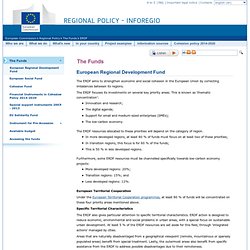
The ERDF focuses its investments on several key priority areas. This is known as ‘thematic concentration’: Innovation and research; The digital agenda; Support for small and medium-sized enterprises (SMEs); The low-carbon economy. The ERDF resources allocated to these priorities will depend on the category of region. In more developed regions, at least 80 % of funds must focus on at least two of these priorities; In transition regions, this focus is for 60 % of the funds; This is 50 % in less developed regions. Furthermore, some ERDF resources must be channelled specifically towards low-carbon economy projects: More developed regions: 20%; Transition regions: 15%; and Less developed regions: 12%. European Territorial Cooperation Specific Territorial Characteristics. Global food security.